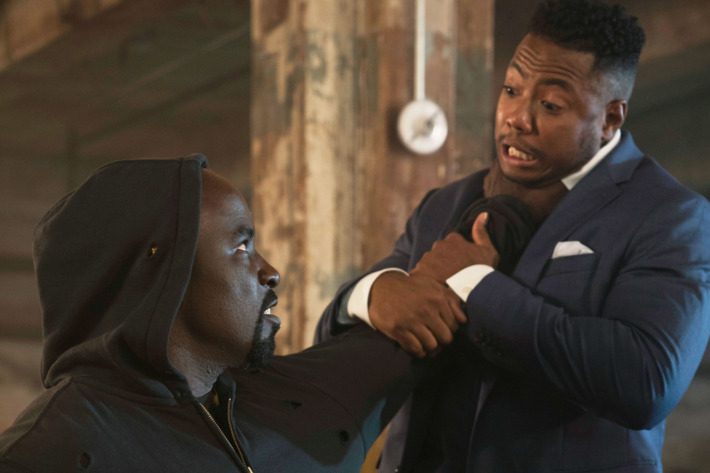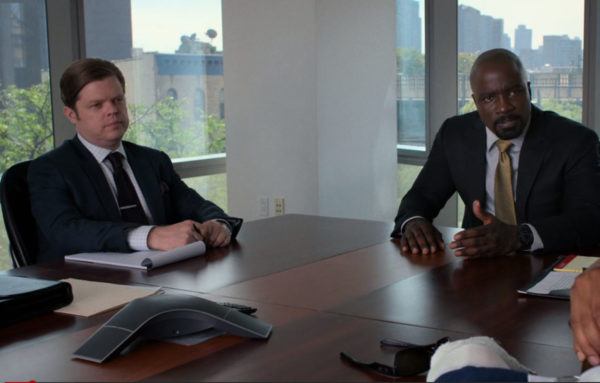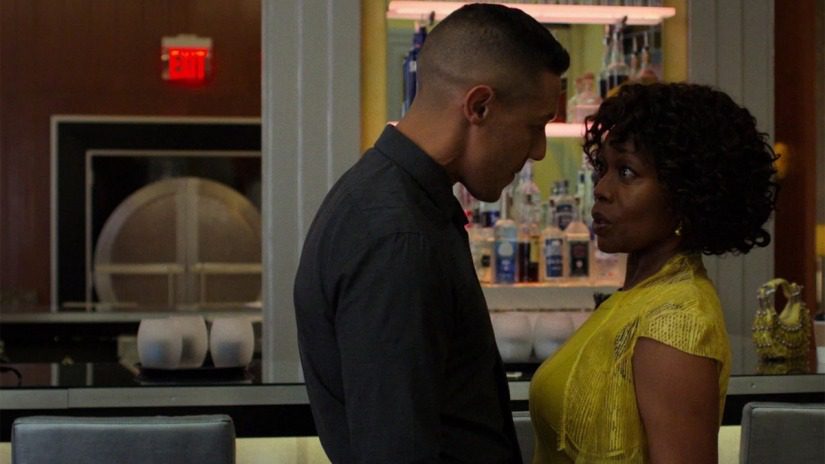“All Souled Out” is a strange episode, because, on paper at least, it does a lot of things that I usually ding Luke Cage for: it’s overlong, meandering, overly expository, the title is a terrible pun, and it’s somewhat inelegantly written. So why does it work, and why does it feel like such a course-correction after “I Get Physical” (hopefully the nadir of the season)? One of my chief complaints about this season thus far is that it’s doing little to justify its length, leading to navel-gazing and wheel-spinning, but “All Souled Out” actually advances the plot, and asks some interesting questions along the way.
I didn’t love the cliffhanger of Luke getting served papers, but it’s paying off nicely, even if the idea of superheroes being held accountable for their actions has been explored in Captain America: Civil War, The Incredibles, and X-Men: The Last Stand. Watching Cockroach paint himself as the victim is truly infuriating, and one sympathizes with Luke when he breaks off a piece of a conference table. The episode takes one of its many political digs when Luke’s lawyer – Foggy Nelson, of course – points out that if Cockroach’s team spins it the right way, Luke will look like “Willie Horton in a hoodie.” It’s a succinct point on the systemic racism of the court system, and how someone of Luke’s size – and, let’s face it, complexion – would have no chance of being found innocent. Mike Colter and Elden Henson have a nice rapport, which is good, because they spend most of the episode together.
Luke Cage has a looser, more comedic vibe at certain points in this episode, and it allows Colter room to be more expressive with a stoic character. There’s a great montage – Luke Cage excels at those, by and large – of Luke trying to drum up money to pay Cockroach. Nike isn’t interested since he got beat up by Bushmaster, he can’t play football, and his only real prospect is a show that wants him to fight a shark.
Throughout “All Souled Out,” Luke is treated less as a person than a commodity, showing the dehumanizing side of fame. When he agrees to an appearance at a party, it’s hosted by Piranha Jones, who turns out to be a Luke Cage fanboy; his wall is covered in Luke memorabilia, including his Seagate uniform and a bullet-riddled car door. At the party, a guest smashes a bottle over Luke’s head; Luke retaliates by picking the man up by his throat, much to his friends’ delight. Here all the phones seem to act like walls closing around Luke, whereas in the earlier third of the season they were his allies, pinging his location on the Harlem’s Hero app and filming him doing good deeds. Now he’s just being gawked at, not inspiring anyone. The one woman who says that he’s an inspiration to her brother does so with her phone out, until Luke sighs, “You want a selfie?” Harlem hasn’t turned on Luke to the cartoonish extent it did in “I Get Physical,” but it is certainly not regarding him as a human. Piranha’s party seems grotesque in certain ways, like a scene out of a Fritz Lang or David Lynch movie.
Where the show is still stumbling is in its treatment of Mariah, who seems to be the world’s first ditzy supervillain. On the one hand, I like the back-and-forth she has with Tilda about community responsibility. Mark Higgins has disappeared, and Mariah blows it off, dismissing him as “a sack of shit who never gave a dime to this community.” She doesn’t care that her grandmother, Mama Mabel, was Harlem’s most notorious madam, because that legacy gives her something to move beyond. “Black women have always had superpowers,” she tells Tilda. “Making pain into profit.” Why, then, is she so unconcerned about Bushmaster? It seems like deliberate character sabotage. Maybe she’ll wise up next episode, because she finds three severed heads (on pikes) in the foyer of her new clinic. It’s a clear message, although Bushmaster might be showing his hand too soon. One hopes Mariah wises up, because her emergence as the show’s heavy was one of the greatest surprises of Luke Cage‘s first season.
At least Shades takes Bushmaster seriously, leading to a great development wherein he and Luke run into each other at Piranha’s party. Theo Rossi and Mike Colter don’t get enough screen time together, which is a shame, because their energies contrast each other well. Watching them team up is a blast, and Luke Cage actually moves its plot forward with its hint at the Heroes for Hire arc.
As always, this show succeeds when it lets its women have the spotlight. The Misty Knight material in “All Souled Out” is great, and once again played exceedingly well by Simone Missick. The bionic arm stuff is fun, but what really makes this episode work are its flashbacks. Misty thinks of all the times that she let Scarfe circumvent the law, whether she knew it or not, and wonders about her complicity in a machine that routinely punishes people for the color of their skin. She stops short of planting evidence herself, but the temptation was there. It’s humanizing, and effective. Frank Whaley makes a welcome return as Scarfe, playing him with pitch-perfect sleazy energy. And director Kasi Lemmons scores the flashbacks with eerie, noirish music that wouldn’t sound out of place in a hard-boiled detective movie.
The real reason this episode succeeds as well as it does is that we don’t see Bushmaster. The first four episodes, the show wouldn’t leave him alone, and he became a less effective boogeyman because of it. But “All Souled Out” has a seriously dangerous edge to it, as people keep disappearing without a trace. At the party, Luke mentions Bushmaster, and Shades starts scanning the place, nervously asking, “Bushmaster? Where?” If Luke Cage had taken this approach from the beginning, it would make for thrilling television. But there’s still time to fix this season’s problems. This episode is proof of that.
A Few Thoughts
- “You can take a honey badger, right?”
- Alfre Woodard is a goddess, but “I ain’t frontin’, T!” sounds like a line written both by and for undercover cops.
- Elden Henson’s performance is quietly revelatory. He was the biggest problem with season one of Daredevil, playing his character at a pitch that no one else was matching. But he’s toned it down so much that he’s become a genuinely compelling character, one who I look forward to seeing. Not bad for someone originally propped up as comic relief.
4/5



